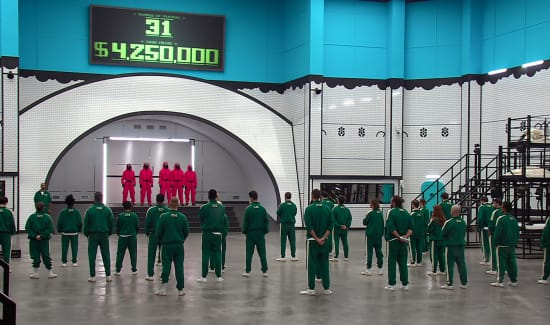
Pretend for a second that Squid Game isn’t a chilling commentary on the evils of capitalism and that it’s actually just fun and games. That’s what it will take to enjoy Squid Game: The Challenge, Netflix’s reality competition based on the hit South Korean drama. The series premieres November 22, and a new trailer released on Friday teases the antics to come.
Here’s the official synopsis: “456 real players will enter the game in pursuit of a life-changing reward of $4.56 million. As they compete through a series of games inspired by the original show – plus surprising new additions – their strategies, alliances, and character will be put to the test while competitors are eliminated around them.”
$4.56 million is a whopping reward—the “biggest cash prize in reality show history,” according to the trailer. “People do a whole lot worse for a whole lot less,” one contestant observes.
At risk of stating the obvious, bringing Squid Game to life is an example of massively missing the point. It’s a story about the horror of spectacle and turning the striving of the oppressed into entertainment for the oppressor. It’s a sort of a Russian nesting doll of dystopia, where the giant entertainment-tech behemoth of Netflix is dangling a near-unimaginable amount of money in front of a group of regular people. And while no one in this version of the game actually dies (though a few of them were injured), pulling the competition out of the context of the show strips away the message, which is that the competition is actually pretty evil, and the fact that the characters are desperate enough to compete is a poor reflection of our society.
Furthermore, Netflix has made a huge investment in South Korean entertainment. On top of dropping a huge cash prize on one lucky contestant for Squid Game: The Challenge, co-CEO Ted Sarandos announced earlier this year that the company would spend $2.5 billion on South Korean television. Yet as of August, Netflix has reportedly outright ignored the Korea Broadcasting Actors Union calls for fairer compensation, concerns that have also been raised by those shows’ writers and crews. (In a statement to the Los Angeles Times, Netflix said it pays fair rates that “meet or exceed Korean law.”) Despite the enormous success of Squid Game, writer-director Hwang Dong-hyuk was only paid per his original contract: “I’m not that rich,” he told The Guardian. “But I do have enough. I have enough to put food on the table. And it’s not like Netflix is paying me a bonus.” (For the record, he encouraged people not to take things “too seriously” when the reality show was announced.)
All this to say, it’s hard to separate Squid Game and the real-life circumstances that inspired it from Squid Game: The Challenge. Netflix is making a big bet on it, though, so we’ll see how many people are able to take their thinking caps off and tune in for some good old-fashioned fun. Are you not entertained?













